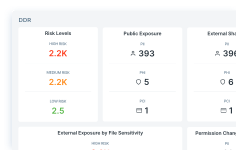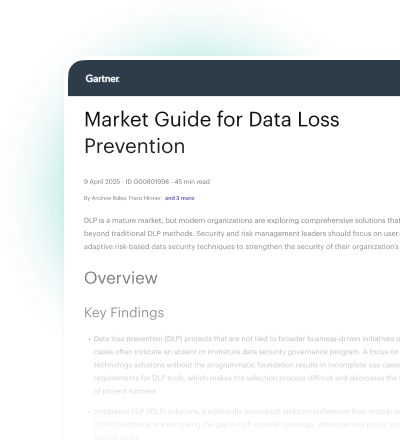What Is Cloud Data Loss Prevention?
Cloud Data Loss Prevention (DLP) protects data within an organization’s cloud storage and applications from being lost, leaked, misused or destroyed.

Cloud Data Loss Prevention Explained
Cloud DLP solutions monitor data moving to and from the cloud to ensure that it is encrypted when necessary and that it is sent only to authorized applications and storage locations. Cloud Data Loss Prevention solutions may also remove sensitive information from files before sending them to the cloud.
Cloud Data Loss Prevention has become increasingly important as regulatory frameworks create new requirements for storing, accessing, using, protecting and retaining specific data. By automating many time-consuming tasks of managing and protecting sensitive data, cloud DLP solutions help IT teams comply more easily and efficiently with regulations like GDPR, PCI DSS, HIPAA, etc.
Protect Data in the Cloud with Forcepoint ONE DLP
How Data Is Lost or Leaked in the Cloud
Data in the cloud may be lost or leaked in various ways.
- Security negligence. Overly broad access permissions or failure to properly configure security controls can make sensitive data in the cloud available to unauthorized individuals or the public.
- Human error. Mistakes are one of the biggest sources of data loss and leaks. Employees may forget to encrypt a file before sending it to cloud storage or accidentally transfer a highly sensitive document to a colleague who does not have proper authorization. Files intended for use in one cloud service may be accidentally sent to another, less secure cloud service.
- Insider threats. Individuals within an organization may inadvertently attempt to access sensitive data without authorization or to maliciously send data in cloud environments to destinations outside the organization.
- Shadow IT. Employees often turn to SaaS-based cloud applications that are unsanctioned by IT to stay productive and share files more easily. When this activity involves sensitive data and confidential files, these files are unprotected by the organization’s security controls.
- Cyberattacks. Cloud storage and applications represent a significant expansion of the attack surface and are attractive targets for cybercriminals seeking access to an IT environment.
How Cloud Data Loss Prevention Works
Cloud Data Loss Prevention solutions combine several technologies and best practices to protect sensitive data assets. Cloud DLP solutions typically include tools that enable IT teams to:
- Discover sensitive information. A cloud Data Loss Prevention solution can help IT teams discover and visualize sensitive information and understand where it lives. This involves scanning both cloud infrastructure and on-premises environments to get a complete picture of all data that must be protected.
- Classify data and create policies. To focus resources on the most significant risk areas, IT teams classify sensitive data according to its business value, the risk that it may be lost or leaked, and the severity of the damage if a data loss incident occurs. After classifying data, security teams can create policies that govern how it may be handled, by whom, where it can be sent and stored, and how it should be protected.
- Limit access. Security teams use technologies like multifactor authentication and access control management to ensure that only authorized individuals can access it.
- Monitor and scan for potential leaks and loss. Cloud Data Loss Prevention solutions provide continuous monitoring of cloud environments and data moving to and from the cloud to search for data that requires encryption or redaction, to ensure that sensitive data is sent only to approved applications, to spot any suspicious activity or unauthorized use and to prevent the data stored in the cloud from being altered or destroyed.
Other Types of DLP Solutions
Cloud Data Loss Prevention solutions are most effective when combined with other DLP solutions designed to protect data throughout the organization.
- Network Data Loss Prevention solutions monitor traffic entering, leaving and moving through the network to search for any violations of DLP policies.
- Endpoint Data Loss Prevention technology monitors and controls access to sensitive information on individual devices like desktops, laptops, servers, mobile phones, and Internet of Things devices.
- Email Data Loss Prevention services monitor the content and attachments in email messages to spot potential leaks and loss. When anomalous or suspicious activity occurs, email DLP solutions can warn the user, flag the email for review by IT, block an email from being sent or delete it altogether.
The most effective DLP solutions protect not only data in motion as it traverses networks and endpoints but also data used by users and applications and data at rest within databases and data stores.
Cloud Data Loss Prevention from Forcepoint
As a leading user security, data security, and Data Loss Prevention company, Forcepoint offers Cloud Data Loss Prevention as part of an all-in-one DLP solution. Forcepoint ONE DLP protects in the cloud and on-premises with technology built to manage today’s most challenging data security risks. To secure data across the cloud, web, network, email and endpoint, Forcepoint ONE DLP makes it easy to discover, classify, monitor and protect data intuitively with zero friction for the user experience.
With Forcepoint DLP, organizations can:
- Simplify DLP and control data with one single policy. Simplify management and enhance productivity by replacing broad, sweeping rules with individualized security that won’t slow down employees.
- Streamline compliance with pre-defined policies. Forcepoint lets security teams view and control data with the industry’s most extensive pre-defined policy library to ensure regulatory compliance across 80+ countries.
- Protect sensitive data with unparalleled accuracy. Forcepoint ONE DLP allows teams to discover and protect trade secrets, financial data, customer credit card information, PII, PHI and other sensitive information, even within images.
- Automatically prevent data breaches. Forcepoint Risk-Adaptive Protection automatically blocks actions based on an individual user’s risk level.
Forcepoint also offers solutions that simplify Google Cloud Data Loss Prevention and augment Data Loss Prevention in Office 365.
Related
2023 Radicati Data Loss Prevention Market Quadrant
View the ReportUnified DLP Revolution: IDC Unveils Game-Changing Solutions
Watch the Webcast








